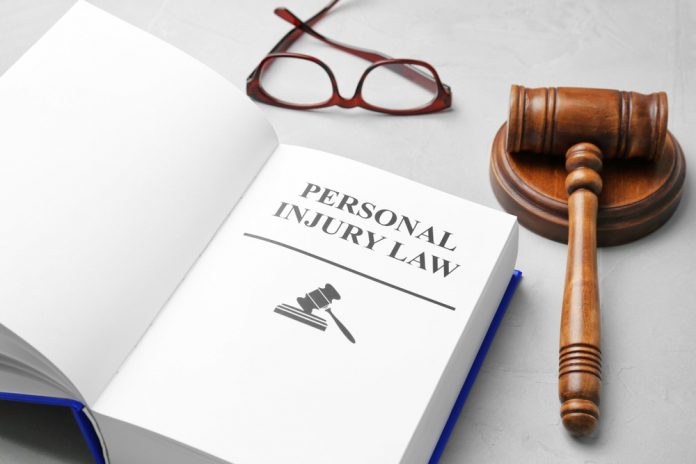You probably know that personal injury cases are a possibility when you’re hurt because of someone else’s actions, but do you know how they work or how you should approach them?
Understanding the basics can equip you with the knowledge necessary to manage your own personal injury, should you suffer one in the future.
The Basics of Personal Injury Law

According to dolmanlaw.com, personal injury lawyers work to protect the legal rights of their clients. If you’re injured as a result of someone else’s actions or negligence, that person will be legally obligated to compensate you for the damage they caused. Together with the help of your personal injury lawyer, you can prepare evidence, create a case, and negotiate to win the compensation you deserve.
Types of Personal Injury

What counts as a personal injury?
There are many types of injuries that qualify:
· Assault and personal attacks
If you’re directly assaulted or attacked by someone, you can file a personal injury lawsuit against them.
· Car, truck, and bike accidents
One of the most common sources of personal injury is a vehicular accident that was someone else’s fault. If you’re hit by a car as a pedestrian or in a car of your own, you may be entitled to compensation.
· Premises liability cases
Property owners are, in many cases, obligated to provide a safe environment for the people on that property. If you slip and fall because of a property owner’s failure to clear snow or post warnings of the wet floor, you may be able to sue the owner.
· Product liability issues
If there’s something wrong with the product you’re using, whether due to a design flaw or a manufacturing defect, and it results in personal injury, you’ll be entitled to compensation.
· Medical malpractice
If your doctor fails to diagnose you accurately, if they give you the wrong treatment, or they cause you harm in some other preventable way, you can sue them for medical malpractice – a type of personal injury suit.
· Workplace injuries
If you’re injured on the job, you may qualify for workers’ compensation – but workers’ comp won’t compensate you for your pain and suffering. Instead, it may be better to file a personal injury lawsuit.
These are just a few of the types of personal injury cases that are typically managed by personal injury lawyers. You can also file suit in the aftermath of a dog bite, food poisoning, exposure to asbestos, and many other situations.
Damages Won in Personal Injury Cases

Why bother?
In many situations, a personal injury case can award you compensation, and in many different forms:
· Direct medical costs
Your medical insurance might have covered some or most of your medical expenses related to this injury, but the person responsible for your injuries should be the one paying for them.
· Long-term medical costs
Some personal injury settlements can provide you with money to cover years’ worth of prescription medications, physical therapy, and other long-term costs.
· Lost wages
Were you out of work because of this injury? If so, the case may also award you compensation based on the wages you lost.
· Pain and suffering
Don’t forget about your subjective pain and suffering. If you experienced pain, loss, or a major change in your lifestyle, you could be compensated financially (even though it’s tough to put a price on these negative factors).
The Initial Consultation

So how do you win these forms of compensation?
Everything starts with an initial consultation with your lawyer, which is typically free. You’ll meet with a personal injury attorney and together you’ll go over the case, including the evidence you’ve collected, the extent of your injuries, and the possibilities for your case to win.
You can talk to multiple lawyers, but eventually, you’ll choose to hire one to best represent you. After hiring a lawyer, you’ll work together to find more evidence, build a case, and go through the early stages of the personal injury claim.
Negotiation, Lawsuit, and Trial

Before filing a lawsuit, you may have the opportunity to settle the claim out of court. The defendant and/or their insurance company may offer you a sum of money in advance to settle the matter as quickly as possible. Your lawyer will help you negotiate this sum, pushing for more money if it seems appropriate. The vast majority of personal injury cases are settled before they go any further.
However, if you can’t reach an agreement, you may need to formally file a lawsuit. At this stage, the case may enter mediation, wherein a third party assists negotiation between the plaintiff and defendant.
Failing that, the case could go to trial; while this process can take weeks, fighting the case in court could possibly help you win the full compensation you deserve. Either way, your lawyer will be with you every step of the way.
Is a Personal Injury Case Worth It?

If you face steep medical bills, or if you want to make sure the person responsible for your personal injuries sees justice, a personal injury case is a no-brainer. But what if you aren’t sure about your chances of victory? Or what if you feel like your injuries are relatively minor? Personal injury cases can be long, drawn-out, and stressful – is it really worth trying to pursue one?
No matter what, you should talk to a personal injury lawyer if you have even a slight suspicion that there’s a case on your hands. Most personal injury lawyers offer initial consultations for free, so they can help you review the nature of your case, your chances of victory, and the type of compensation you might win. You have nothing to lose except a bit of your time, so it’s worth following through.
Personal injury law is complicated, but your decision to file a personal injury case doesn’t have to be. Start working with a legal expert as early as possible in the process and your path forward will be much easier and clearer.









